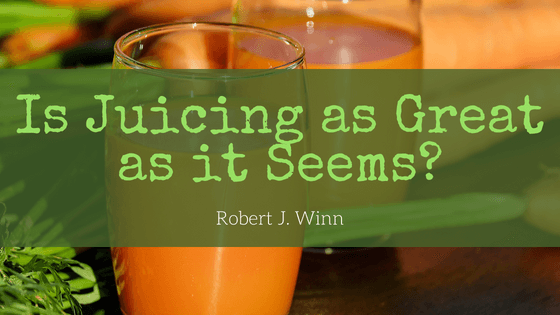Juicing is all the rage lately. It seems to be a quick and easy way to get all of your servings of fruits in vegetables in one sitting. Joe Cross made a documentary about his extreme weight loss as a result of juicing. But is juicing as healthy as it seems?
Juicing has no more health benefits than just eating whole fruits and vegetables. However, if you don’t enjoy eating fruits and vegetables, it can be an easy way to get nutrients you normally would be missing out on.
Juices may contain more sugars than you realize. If you’re loading up your juices with fruit for flavor, you could be consuming a lot of sugar. Vegetables should be serving as the foundation of your juice, while fruit should just be an additive. When eating whole fruits, the sugar isn’t as harmful because you’re also consuming fiber, which helps to slow the absorption of sugar in the bloodstream.
But, when you turn fruit into juice, you’re removing the fiber that’s found in the pulp. One alternative to this is blending your fruits and vegetables. Blending creates a drink that contains more phytonutrients and retains the fiber, which helps you feel more full.
Drinking solely juice for an extended period of time can dramatically slow your metabolism. Research shows that eating a very-low-calorie diet for longer than 72 hours will slow your metabolism down. If you decide to partake in a juice fast for a few days, you may not experience the weight loss you expect.
If you have kidney or thyroid problems, you may want to step away from the juicer. Incorporating lots of fruits and vegetables with large amounts of potassium into your diet through juicing can be deadly for someone with kidney problems. An average adult needs about 4,700 mg of potassium every day, and your kidneys excrete the excess. However, those who have compromised kidneys can’t do that, and instead, the potassium builds up in their blood, which can increase your chance of heart attack or stroke.
Kale, bok choy, cauliflower, collards and spinach belong to a subset of vegetables called goitrogens. These contain substances that stop the thyroid from absorbing iodine. By blocking iodine absorption, you’re blocking thyroid hormone production, which can lead to weight gain, hair loss, low body temperature, digestive issues, and depression.
While juicing can be a good addition to a diet already full of whole foods, it can also be harmful to your health. If you plan to start juicing, keep in mind the downsides

